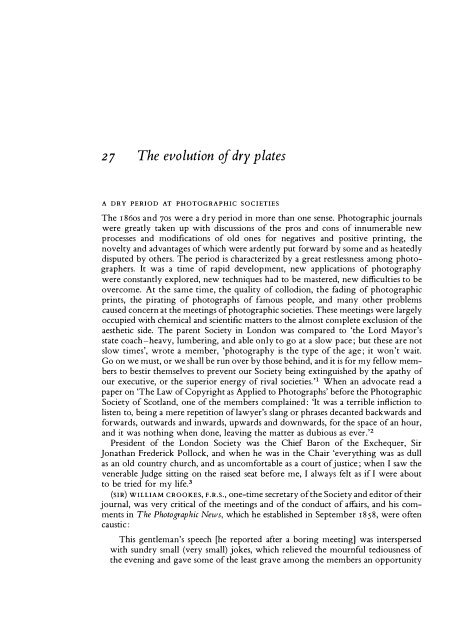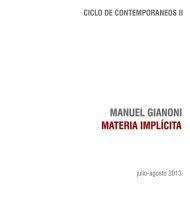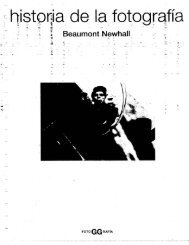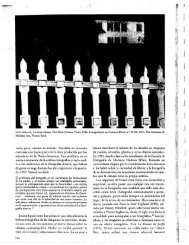- Page 1:
llllf NORFOLK COLLEGE LIBRARY JRllJ
- Page 4 and 5:
t,i{g 8 . . '-'' ' ., ;-.-- - ... -
- Page 6 and 7:
In honour and loving memory of ALIS
- Page 8 and 9:
6 Contents 6 The daguerreotype Dagu
- Page 10 and 11:
8 Contents 21 Instantaneous photogr
- Page 12 and 13:
IO Contents Under-water photography
- Page 14 and 15:
12 Foreword Many of the ex 1 stmg c
- Page 16 and 17:
14 Introduction effects, for which
- Page 19 and 20:
1 The history of the camera obscura
- Page 21 and 22:
The history of the camera obscura 1
- Page 23 and 24:
The history of the camera obscura 2
- Page 25 and 26:
The history of the camera obscura 2
- Page 27 and 28:
The history of the camera obscura 2
- Page 29 and 30:
The history of the camera obscura 2
- Page 31 and 32:
The history of the camera obscura 2
- Page 33 and 34:
Photochemical investigations 3 l Th
- Page 35 and 36:
Photochemical investigations 3 3 en
- Page 37 and 38:
3 Phantoms of photography TIPHAIGNE
- Page 39 and 40:
4 The first conception of photograp
- Page 41 and 42:
The first conception of photography
- Page 43 and 44:
The first conception of photography
- Page 45 and 46:
Plates 1-16
- Page 47 and 48:
1 CEMMA-1 ms1us. First published il
- Page 49 and 50:
lfll'-••• ,I !""--.·11 ft ..
- Page 51 and 52:
l), i 7 JOHANN ZAHN. Reflex box cam
- Page 53 and 54:
\
- Page 55:
Part II ' THE IN VENTIO N OF PHOTOG
- Page 58 and 59:
56 The invention of photography and
- Page 60 and 61:
58 The invention of photography Pl
- Page 62 and 63:
60 The invention of photography Pl
- Page 64 and 65:
62 The invention of photography Nie
- Page 66 and 67:
64 The invention of photography Pl
- Page 68 and 69:
66 The invention of photography Pl
- Page 70 and 71:
68 The invention of photography P .
- Page 72 and 73:
70 The invention of photography RAP
- Page 74 and 75:
72 The invention of photography con
- Page 76 and 77:
74 The invention of photography Fig
- Page 78 and 79:
76 The invention of photography fix
- Page 80 and 81:
78 The invention of photography spo
- Page 82 and 83:
80 The invention of photography Fig
- Page 84 and 85:
82 The invention of photography Tal
- Page 86 and 87:
8 Direct positives on paper Pl 40 H
- Page 88 and 89:
86 The invention of photography It
- Page 90 and 91:
9 Other independent inventors Fig 9
- Page 92 and 93:
90 The invention of photography Pl
- Page 94 and 95:
92 The invention of photography Rea
- Page 96 and 97:
94 The invention of photography Deu
- Page 98 and 99:
96 The invention of photography I2
- Page 100 and 101:
98 The invention of photography cou
- Page 103 and 104:
17 NicEPHORE NIEPCE. Pencil and was
- Page 105 and 106:
"1- t ... .f"' · . ·, "i._. ' )<
- Page 108 and 109:
- -- r 29 'Daguerreotypomanie', car
- Page 111 and 112:
L Vc&-w · ( ,;.,,/£ $
- Page 114 and 115:
42 SIR J. F. w. HERSCHEL, photograp
- Page 117 and 118:
1 o The daguerreotype in France In
- Page 119 and 120:
The daguerreotype in France 117 FRA
- Page 121 and 122:
The daguerreotype in France 119 The
- Page 123 and 124:
The daguerreotype in America 121 wi
- Page 125 and 126:
The daguerreotype in America 123 -:
- Page 127 and 128:
The daguerreotype in America 125 Fi
- Page 129 and 130:
The daguerreotype in America I27 th
- Page 131 and 132:
The daguerreotype in America I 29 T
- Page 133 and 134:
The daguerreotype in Great Britain
- Page 135 and 136:
The daguerreotype in Great Britain
- Page 137 and 138:
The daguerreotype in Great Britain
- Page 139 and 140:
The daguerreotype in Great Britain
- Page 141 and 142:
The daguerreotype in Great Britain
- Page 143 and 144:
The daguerreotype in Great Britain
- Page 145 and 146:
The daguerreotype in Great Britain
- Page 147 and 148:
The daguerreotype in Great Britain
- Page 149 and 150:
The daguerreotype in Great Britain
- Page 151 and 152:
The daguerreotype in Great Britain
- Page 153 and 154:
The daguerreotype in Great Britain
- Page 155 and 156:
The daguerreotype in Great Britain
- Page 157 and 158:
13 The daguerreotype in German-spea
- Page 159 and 160:
The daguerreotype in German-speakin
- Page 161 and 162:
The daguerreotype in German-speakin
- Page 163 and 164:
The daguerreotype in German-speakin
- Page 165 and 166:
The calotype and other paper proces
- Page 167 and 168:
The ca lo type and other paper proc
- Page 169 and 170:
The calotype and other paper proces
- Page 171 and 172:
The ca lo type and other paper proc
- Page 173 and 174:
The calotype and other paper proces
- Page 175 and 176:
The calotype and other paper proces
- Page 177 and 178:
The calotype and other paper proces
- Page 179 and 180:
The ca lo type and other paper proc
- Page 181 and 182:
The calotype and other paper proces
- Page 183 and 184:
The calotype and other paper proces
- Page 185 and 186:
The calotype and other paper proces
- Page 187 and 188:
15 The progress of photography on p
- Page 189 and 190:
The progress of photography on pape
- Page 191 and 192:
The progress of photography on pape
- Page 193 and 194:
The progress of photography on pape
- Page 195 and 196:
The progress of photography on pape
- Page 197 and 198:
The introduction of photography on
- Page 199 and 200:
The introduction of photography on
- Page 201 and 202:
The introduction of photography on
- Page 203 and 204:
The introduction of photography on
- Page 205 and 206:
The introduction of photography on
- Page 207 and 208:
The introduction of photography on
- Page 209:
Plates 43-96
- Page 213 and 214:
46 FRIEDRICH VON MARTENS. Panoramic
- Page 215:
52 RICHARD BEARD. Portrait of a lad
- Page 218 and 219:
60 Voigtlander metal daguerreotype
- Page 220:
67 DR JOHN ADAMSON. Negative and po
- Page 223:
75 srn JOHN HERSCHEL. Cyanotype of
- Page 227:
- · 84 Unknown calotypist. Zeughau
- Page 230 and 231:
94 HIPPOL YTE BA y ARD · G arden s
- Page 232 and 233:
•
- Page 234 and 235:
232 The collodion period daguerreot
- Page 236 and 237:
18 Portrait photography-a new indus
- Page 238 and 239:
236 The collodion period Portrait p
- Page 240 and 241:
23 8 The collodion period LIKENESSE
- Page 242 and 243:
240 The collodion period ART ·PROG
- Page 244 and 245:
242 The collodion period The cost o
- Page 246 and 247:
244 The collodion period J. LAI N G
- Page 248 and 249:
246 The collodion period Pl 104 OSC
- Page 250 and 251:
248 The collodion period dictum tha
- Page 252 and 253:
250 The collodion period Pl 112 as
- Page 254 and 255:
252 The collodion period The proces
- Page 256 and 257:
254 The collodion period v x· Fig
- Page 258 and 259:
256 The collodion period normal dis
- Page 260 and 261:
2 5 8 The collodion period Pis 124,
- Page 262 and 263:
260 The collodion period With scien
- Page 264 and 265:
262 The collodion period square, bu
- Page 266 and 267:
264 The collodion period Pl r 29 J>
- Page 268 and 269:
22 News photography Many people are
- Page 270 and 271:
268 The collodion period Pl I39 Pl
- Page 272 and 273:
270 The collodion period bareness o
- Page 274 and 275: 272 The collodion period Pl 144 Gar
- Page 276 and 277: 274 The collodion period by the Pru
- Page 278 and 279: 276 The collodion period Fig 36 Tra
- Page 280 and 281: 278 The collodion period Fig 3
- Page 282 and 283: 280 The collodion period different
- Page 284 and 285: 282 The collodion period publicatio
- Page 286 and 287: 284 The collodion period Pl r 62 Pl
- Page 288 and 289: 286 The collodion period despaired
- Page 290 and 291: 288 The collodion period Pl 1 68 Pl
- Page 292 and 293: 290 The collodion period Pl 174 MOU
- Page 294 and 295: 292 The collodion period always bro
- Page 296 and 297: 294 The collodion period direct in
- Page 298 and 299: 296 The collodion period Pl r84 Pl
- Page 300 and 301: 298 The collodion period profession
- Page 302 and 303: 300 The collodion period Pl 185 bro
- Page 304 and 305: 302 The collodion period Pl 190 Pl
- Page 306 and 307: 25 Some famous portrait photographe
- Page 308 and 309: 306 The collodion period light acco
- Page 310 and 311: 308 The collodion period ahead of t
- Page 312 and 313: 31 o The collodion period excellenc
- Page 314 and 315: 3 12 The collodion period Fig 43 Wo
- Page 316 and 317: 3 14 The collodion period A. A shee
- Page 318 and 319: 316 The collodion period portraits
- Page 320 and 321: 318 The collodion period A few mont
- Page 322 and 323: 320 The collodion period Fig 47 Pig
- Page 326 and 327: 324 The collodion period 3. Coverin
- Page 328 and 329: 326 The collodion period he went to
- Page 330 and 331: 3 28 The collodion period wet collo
- Page 332 and 333: 3 30 The collodion period R. KENNET
- Page 334 and 335: 3 32 The collodion period The chang
- Page 336 and 337: 334 The collodion period i.e. repro
- Page 338 and 339: 3 36 The collodion period FOUNDED A
- Page 340 and 341: 338 The collodion period first publ
- Page 342 and 343: 340 The collodion period Annan. Thr
- Page 344 and 345: 342 The collodion period called Sta
- Page 346 and 347: 344 The collodion period coating be
- Page 349 and 350: Plates 97-218
- Page 351 and 352: 97 Unknown photographer. Coloured a
- Page 354 and 355: 107 H. P. ROBINSON, photograph by h
- Page 356: I I I WILLIAM LAKE PRICE. Dead game
- Page 359 and 360: · · . 124 Unknown photographer.
- Page 362: 130 G. w. WILSON. Waiting for the b
- Page 366: 137 ROGER FENTON ' s photographic v
- Page 370 and 371: 147 ALEXANDER GARDNER. The executio
- Page 372 and 373: 153 HENRY WHITE. A cornfield, 1856
- Page 374:
57 ROBERT MACPHERSON. Cascades at T
- Page 378:
163 CARLO PONTI. Courtyard of the D
- Page 382 and 383:
179 DISDERJ. The French Imperial fa
- Page 384:
!esJbh• 1s m);!Albu:m, iut !tarn
- Page 387 and 388:
192 THOMAS ANNAN. David Livingstone
- Page 390 and 391:
200 NA DAR. 'George Sand'. Carbon p
- Page 393 and 394:
202 ETIENNE CARJA T. Baudelaire. Ca
- Page 395 and 396:
2ro o. G. REJLANDER. Lewis Carroll
- Page 397:
Part V THE GELATINE PERIOD
- Page 400 and 401:
400 The gelatine period and in the
- Page 402 and 403:
402 The gelatine period Pl 219 year
- Page 404 and 405:
404 The gelatine period that has ta
- Page 406 and 407:
406 The gelatine period application
- Page 408 and 409:
408 The gelatine period / in I886.
- Page 410 and 411:
3 1 Hand, pocket, and detective cam
- Page 412 and 413:
412 The gelatine period PATENT GELA
- Page 414 and 415:
41 4 The gelatine period F1·1 1. l
- Page 416 and 417:
4i6 The gelatine period Fig 58 POCK
- Page 418 and 419:
418 The gelatine period Pis 223, 22
- Page 420 and 421:
420 The gelatine period Enough has
- Page 422 and 423:
32 Push-button photography The year
- Page 424 and 425:
424 The gelatine period Fig 62 one
- Page 426 and 427:
33 Photography by artificial light
- Page 428 and 429:
428 The gelatine period Pl 230 Pl 2
- Page 430 and 431:
430 The gelatine period Pl 232 The
- Page 432 and 433:
432 The gelatine period to be twice
- Page 434 and 435:
434 The gelatine period great popul
- Page 436 and 437:
436 The gelatine period Pl 240 whic
- Page 438 and 439:
43 8 The gelatine period apparatus
- Page 440 and 441:
440 The gelatine period Pls 242, 24
- Page 442 and 443:
442 The gelatine period removed in
- Page 444 and 445:
444 The gelatine period circumferen
- Page 446 and 447:
446 The gelatine period Massachuset
- Page 448 and 449:
448 The gelatine period A similar i
- Page 450 and 451:
450 The gelatine period EUGENE ATGE
- Page 452 and 453:
36 Press photograp hy There was no
- Page 454 and 455:
454 The gelatine period Pl 272 East
- Page 456 and 457:
3 7 Naturalistic photography In cha
- Page 458 and 459:
458 The gelatine period Soft focus,
- Page 460 and 461:
460 The gelatine period EPITAPH. Jn
- Page 462 and 463:
462 The gelatine period Horsley Hin
- Page 464 and 465:
464 The gelatine period During the
- Page 466 and 467:
466 The gelatine period It is stran
- Page 468 and 469:
468 The gelatine period artistic me
- Page 470 and 471:
4 70 The gelatine period scores of
- Page 473 and 474:
219 G. w. WILSON ' S printing works
- Page 475 and 476:
228 Demonstration of magnesium ligh
- Page 478:
235 VICTOR ANGERER. The Prater, Vie
- Page 481:
244 E. J. MAREY's arrangement for c
- Page 485 and 486:
255 JOHN THOMSON. Old woman with ba
- Page 489 and 490:
261 ARNOLD GENTHE. Emergency feedin
- Page 492 and 493:
5 6!'.PTSMIUU:: 1886 PRIX ! f5 CEN7
- Page 494:
27) G. w. WILSON. Operation by Sir
- Page 497:
282 B. GAY WILKINSON. Sand dunes. P
- Page 500 and 501:
29 l M. BUCQUET. 'Effet de Pluie',
- Page 502:
299 HEINRICH KUHN. Venice. Gum prin
- Page 505:
Part VI SOME APPL I CA TIO NS OF PH
- Page 508 and 509:
508 Some applications of photograph
- Page 510 and 511:
5 IO Some applications of photograp
- Page 512 and 513:
512 Some app lications of photograp
- Page 514 and 515:
4 1 Photography of criminals1 ' "Si
- Page 516 and 517:
516 Some applications of photograph
- Page 518 and 519:
5 I 8 Some applications of photogra
- Page 521 and 522:
4 3 The evolution of colour photogr
- Page 523 and 524:
The evolution of colour photography
- Page 525:
The evolution of colour photography
- Page 528 and 529:
· ··".!..
- Page 530:
3 I I HONORE DAUMIER. 'Nadar elevan
- Page 533 and 534:
3 I 4 An unwilling sitter for a pol
- Page 535 and 536:
321 E. & J. BULLOCK. Woodland scene
- Page 537:
Part VIII PHOTOGRAPHY AND THE PRINT
- Page 540 and 541:
540 Photography and the printed pag
- Page 542 and 543:
542 Photography and the printed pag
- Page 544 and 545:
544 Photography and the printed pag
- Page 546 and 547:
546 Photography and the printed pag
- Page 548 and 549:
548 Photography and the printed pag
- Page 550 and 551:
5 50 Photography and the printed pa
- Page 552 and 553:
5 52 Photography and the printed pa
- Page 554 and 555:
5 54 Conclusion most of the works o
- Page 556 and 557:
556 The history of photography 24 A
- Page 558 and 559:
558 The history of photography Part
- Page 560 and 561:
560 The history of photography 8 Ib
- Page 562 and 563:
562 The history of photography 16 F
- Page 564 and 565:
564 The history of photography Verf
- Page 566 and 567:
566 The history of photography 16 T
- Page 568 and 569:
568 The history of photography 20 S
- Page 570 and 571:
570 The history of photography 24 I
- Page 572 and 573:
572 The history of photography 11 T
- Page 574 and 575:
574 The history of photography 2 Th
- Page 576 and 577:
576 The history of photography 19 T
- Page 578 and 579:
578 The history of photography 40 U
- Page 580 and 581:
Bibliography In addition to the num
- Page 582 and 583:
Appendix EXPOSURE TIMES The table g
- Page 584 and 585:
5 84 The history of photography Fir
- Page 586 and 587:
586 The history of photography THE
- Page 588 and 589:
588 The history of photography ANNU
- Page 590 and 591:
590 Index Baudelaire, Charles 243,
- Page 592 and 593:
592 Index Dictionary of National Bi
- Page 594 and 595:
594 Index Hoegh, Emil van (1865-191
- Page 596 and 597:
596 Index Neff, Peter 2J8 negative,
- Page 598 and 599:
598 Index Science Museum, London 57









